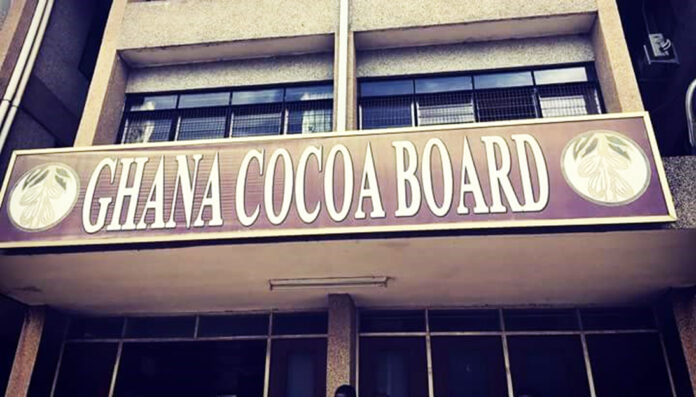The Ghana Cocoa Board (COCOBOD) has announced a GH¢2,000 incentive package for informants on every bag of cocoa retrieved from smugglers, according to a Graphiconline report.The package would be shared by the informants and security officials who effect the arrest of culprits of cocoa smuggling.
The Chief Executive Officer (CEO) of the COCBOD, Joseph Boahen Aidoo, who made the announcement, has consequently called on farmers to report cocoa smugglers to the law enforcement agencies for arrest and prosecution.He stressed that the action had become imperative as the activities of the smugglers were depriving the nation of the necessary revenue.
Mr Boahen Aidoo made the announcement at an engagement with over 3,000 cocoa farmers at separate functions at Akyem Oda in the Birim Central Municipality, Akyem Abenase, in Akyemansa and Asuokaw in the Upper West Akyem districts, all in the Eastern Region last Tuesday.
The Chronicle supports Mr. Boahen Aidoo on his idea of giving incentives to informants who help retrieve smuggled cocoa. For a very long time, cocoa smuggling has been very rampant in the country. Cocoa is not just an agricultural product; it is an economic lifeline.
As one of the country’s leading foreign exchange earners, cocoa contributes approximately $2 billion annually to the national economy, underpinning rural livelihoods and generating government revenue.
However, the illicit smuggling of the commodity to neighboring countries is eroding these gains, posing a significant threat to economic stability and the sustainability of the sector.
The scale of cocoa smuggling is staggering. In 2022, an estimated 150,000 metric tons of cocoa beans valued at approximately $600 million were illegally transported out of Ghana to markets in neighboring countries such as Togo and others.
These losses are primarily driven by price disparities between Ghana and its neighbors. While the government this year increased the producer price of cocoafrom GH₵3,000 to GH₵3,100 per bag and GH₵48,000 to GH₵49,600 per tonne, the neighbouring countries often offer even higher rates, incentivising farmers to bypass the formal market for more lucrative, albeit illegal, alternatives.
The consequences of cocoa smuggling extend beyond lost revenue. For a country heavily reliant on cocoa exports for foreign exchange earnings, smuggling disrupts critical financial inflows, worsening Ghana’s balance of payments challenges. It also deprives the government of taxes and levies that are essential for funding public infrastructure and services.
The country’s cocoa sector, already grappling with challenges such as illegal mining, climate change and declining productivity is further weakened by these illicit activities. For example, cocoa production dropped significantly in the 2022/2023 crop season to 750,000 metric tons from over one million tons just two years earlier.
The Chronicle is also of the view that smuggling also jeopardises the country’s international reputation as a leading cocoa producer.
Moreover, smallholder farmers who form the backbone of the industry suffer indirect consequences. While some may benefit temporarily from higher prices, their participation in smuggling often excludes them from government incentives such as subsidies and extension services designed to enhance productivity and long-term sustainability.
The need for decisive action is urgent. The Ghana Cocoa Board (COCOBOD) incentive package to reward informants who help prevent smuggling is a step in the right direction.
While this initiative is commendable, it cannot, in our view, wholly address the systemic factors fuelling the crisis. Smuggling is driven by a combination of economic incentives and governance gaps, requiring a holistic approach to tackle the issue effectively.
Addressing cocoa smuggling requires aligning local cocoa prices with regional markets to eliminate the economic disparity that incentivizes illicit trade. Enhanced border surveillance and investments in technology can aid in detecting and intercepting smuggled cocoa beans.
Also, collaborative frameworks with neighbouring countries could harmonize pricing structures and reduce the market allure of smuggling. Additionally, empowering farmers through improved access to credit, training, and support services can address the root causes driving them towards illegal activities.
However, this strategy, while commendable, should not be limited to cocoa. Other sectors, particularly gold mining, also suffer from smuggling and mismanagement, resulting in significant revenue losses.
For example, in January 2019, it was reported that over ¢30 billion worth of gold had left the shores of Ghana without official knowledge.
These examples highlight a troubling trend of resource leakage, which calls for the need for comprehensive reforms across multiple sectors to protect national assets and revenues.
If these smugglings are left unchecked, it risks destabilizing a critical industry, eroding public trust in governance, and exacerbating poverty in rural communities.
The government, industry stakeholders, and international partners must collaborate to implement sustainable solutions that prioritize fair pricing, robust surveillance, and the empowerment of cocoa farmers.









